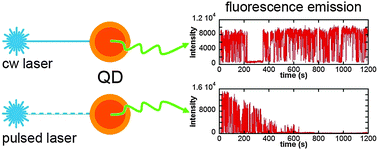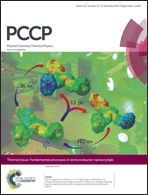The influence of continuous vs. pulsed laser excitation on single quantum dot photophysics†
Abstract
The impact of pulsed versus continuous wave (cw) laser excitation on the photophysical properties of single quantum dots (QDs) has been investigated in an experiment in which all macroscopic variables are identical except the nature of laser excitation. Pulsed excitation exaggerates the effects of photobleaching, results in a lower probability of long ON fluorescence blinking events, and leads to shorter fluorescence lifetimes with respect to cw excitation at the same wavelength and average intensity. Spectral wandering, biexciton quantum yields, and power law exponents that describe fluorescence blinking are largely insensitive to the nature of laser excitation. These results explicitly illustrate important similarities and differences in fluorescence dynamics between pulsed and cw excitation, enabling more meaningful comparisons between literature reports and aiding in the design of new experiments to mitigate possible influences of high photon flux on QDs.

- This article is part of the themed collection: Fundamental Processes in Semiconductor Nanocrystals

 Please wait while we load your content...
Please wait while we load your content...